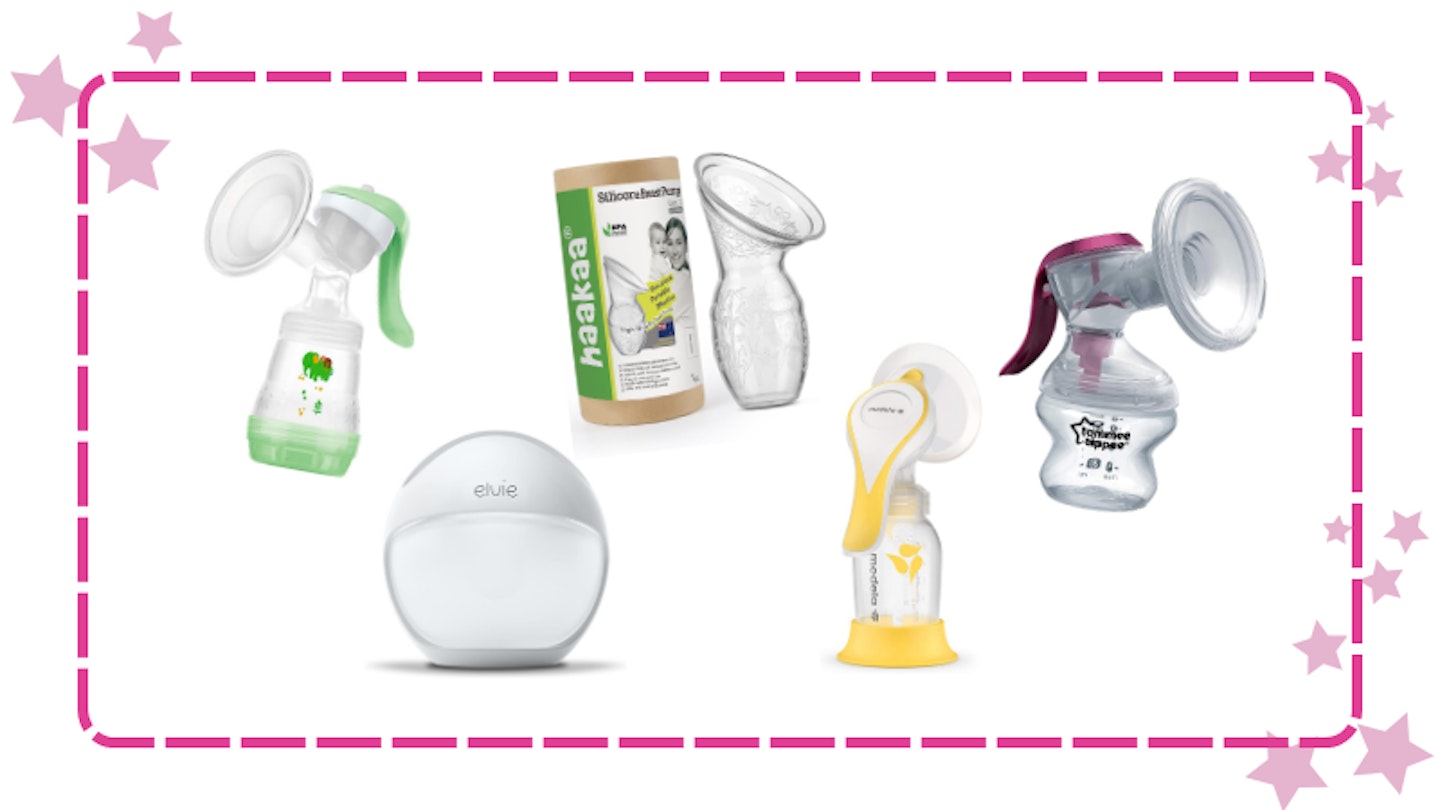Medically reviewed by qualified midwife Angie Willis, aka The Eco Midwife
When breastfeeding, it can be extremely helpful to have the best breast pump that works for you. A manual breast pump, in particular, is a great way to express milk while keeping you in control of the speed and intensity of suction. If you're wondering if a manual breast pump is right for you or how to use a manual breast pump, keep reading.
There are two types of breast pumps: manual and electric. A manual breast pump mimics a baby's suckling and allows you to control the speed and intensity of the suction. It is hand-operated and is often cheaper than electric breast pumps, which may be faster but offer less control. You can also buy a breast pump bra to help hold your pump in place. These are particularly handy if you struggle to find the best breast pumping position for you, but depending on how often you need to pump breast milk, they may not be suited for extensive pumping.
It can be difficult for mums who are returning to work, have multiple children or just want to share the load of breastfeeding by introducing bottles to involve their partner. A manual breast pump is also useful for pumping when out and about, as you don't have to worry about finding somewhere to plug in, which some electric pumps require.
Best deals on manual breast pumps:
27% OFF: Medela Harmony Manual Breast Pump, WAS £29.99, NOW £21.81
25% OFF: Elvie Manual Wearable Breast Pump, WAS £34.99, NOW £26.24
5% OFF: Fraupow Squeeze Manual Breast Pump, WAS £26.95, save 5% with code: SAVE5
25% OFF: Pippeta Silicone Manual Milk Collector, WAS £11,save 5% with code: SAVE5
£16 OFF: MAM Manual Breast Pump, WAS £48, NOW £32
£4.83 OFF: Lansinoh Silicone Breast Pump, WAS £14.49, NOW £9.66
£6.50 OFF: Tommee Tippee Silicone Manual Breast Pump With Sterilising Lid, WAS £12.99, NOW £6.49
If you're looking for a manual breast pump that will work for you and your lifestyle, check out our carefully curated list of the best below.
The best manual breast pumps at a glance:
How we tested and chose these breast pumps
Our Mother&Baby awards are renowned in the industry as one of the most highly respected product awards for baby and parenting products. Every year, we arrange for thousands of independent mum reviewers to test the latest products on the market.
We've tested over 60 of the best models available in the UK, with around 10 reviewers per product, to ensure that we get a range of views on the product.
Once we’ve recruited our pool of testers, we ask them to consider four areas while testing: usability, design, quality, and value for money. They are also asked to provide feedback on their experience with the product and whether they would make any changes to improve it.
Find out more about how we test and what considerations we consider in our testing process.
Our independent mums give us qualitative feedback on their experience with the product, which our team of journalists review to decide our recommended products.
From all this work, we have chosen the best breast pumps and listed them below, along with the review comments that we thought would be most useful to those looking for the best breast pump.
Our editorial team also constantly updates our best articles and looks for new breast pumps to test so that we can help you find the best—be that a cheaper product that we want to test for value for money or the latest innovation.
The Best Manual Breast Pumps 2024
Best Manual Breast Pump overall
This manual pump won Bronze in the Mother&Baby 2023 awards.
This is a simply designed breast pump that is particularly helpful for collecting leaked milk from the breast that is not in use when breastfeeding. The difference between this and other similar designs on the market is that the Lansinoh pump includes a neck strap and a suction pad on the bottom of the vessel to help prevent spillage - this is in recognition of the fact that mums are often operating one-handed as they are nursing baby with the other.
"During my breastfeeding experience, I’ve always needed to have a silicone pump on the breast I’m not feeding on due to oversupply, but I’ve really struggled to find one that will suction on and stay put - not lose suction really quickly," said our Mother&Baby reviewer Rai. "This one I found stayed on and was extremely comfortable to use too, and didn’t cause any discomfort."
Another of our mum testers said: "I tended to use it in the mornings when my breasts were engorged. While the baby fed on one breast, I would use the Lansinoh pump to collect leaking milk or lessen the engorgement from the other breast. As the collector filled and my breast reduced in size, I could fine-tune the suction by gently releasing and reattaching. Feeding my baby and using the collector simultaneously saved me time in the mornings and gave me some fresh milk to try with the bottle later on or freeze."
We also love that this pump is small enough to be carried discreetly. It's a standout choice in our books and is of good value for money.
Read our full Lansinoh Silicone Breast Pump review
Pros
- Easy to use
- Small and portable
- Comes with a neck strap and suction on the bottom of the vessel to help prevent spills
- Budget-friendly
Cons
- Strong suction might be too much for some mums
- Dishwasher Safe
- Portable and lightweight
- Catches excess breast milk
27% off
Best Manual Breast Pump for comfort
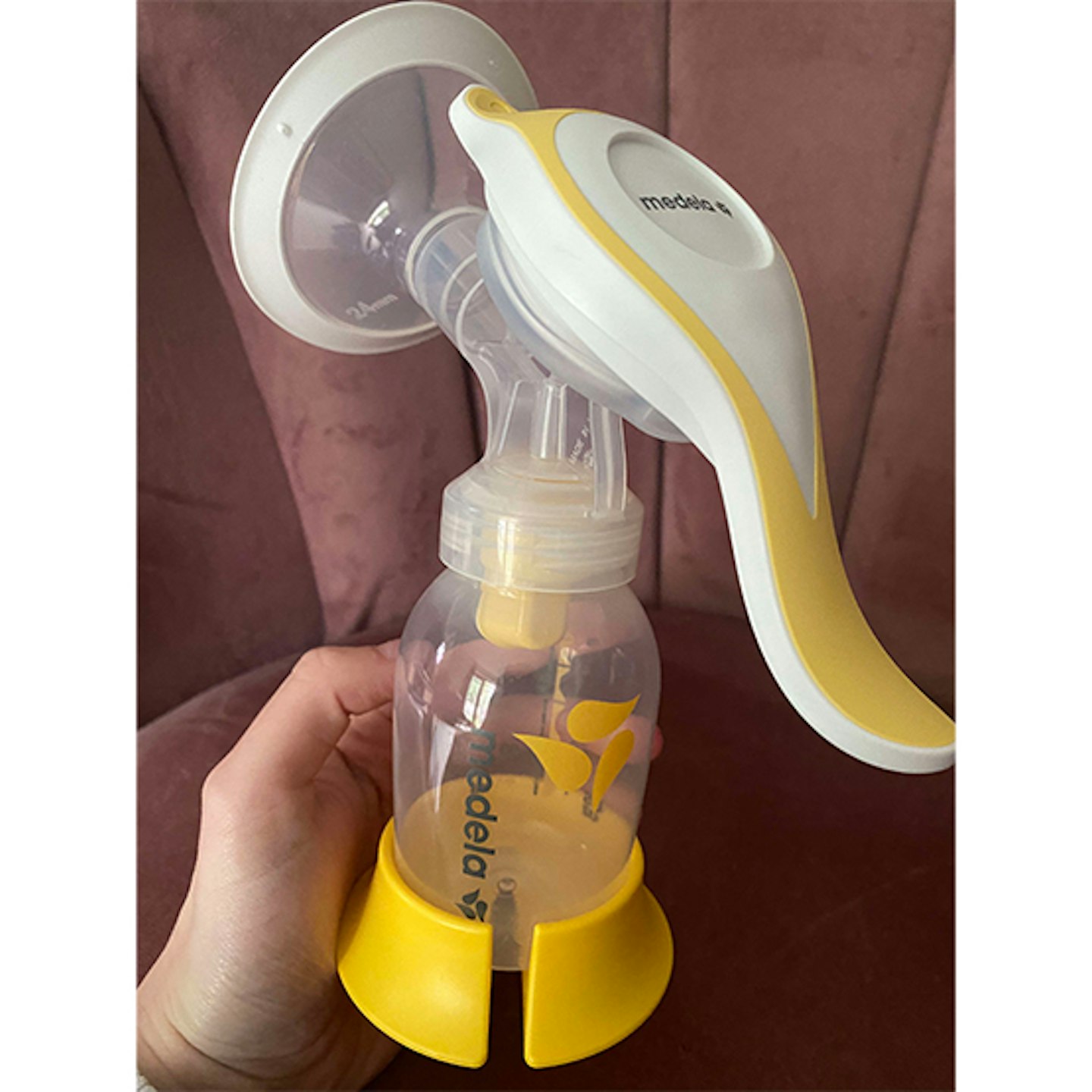 MOTHER&BABY
MOTHER&BABYMedela is a trusted brand in the breast pump sphere, so its Medela Harmony Manual Breast Pump gets the overwhelmingly great reviews you'd expect. It has a wide 105-degree opening angle which means it puts less strain on your nipple and helps unblock milk ducts. Some mums have found that this leads to a more comfortable pumping experience. Reviewers also liked the stand it comes with to help prevent milk spillage.
Most mums found it was great to collect a good supply of milk in just a few minutes and that it was good to be able to control the speed and rhythm via an easy-to-use handle. "This is the third manual pump I’ve used and by far the best one," said one tester. "It’s more effective in collecting milk as you can use the stimulation phase first using your thumb for short pumps and then change to longer pumps using the main lever."
"Worked well for me; I even managed one-handedly feeding the baby on one side and expressing it on the other," said another mum. "It disassembles easily for sterilising. The only thing that could be better is that it has a bottle and a lid for storing but doesn't come with a teat to be able to feed from the bottle. So would need to purchase separately."
Read the full Medela Harmony Flex Manual Breast Pump review
Pros
- Two-phase expression
- Control the speed and flow of expression via the handle
- Comes with a stand to help prevent milk spillage
- Discreet and quiet use
Cons
- Sometimes requires repositioning when using
- Requires a teat for feeding - to be bought separately
- Oval shaped shield
- Mimics instinctive rhythms
- Compact design
Save £16
Best Manual Breast Pump for Compatibility with other kit
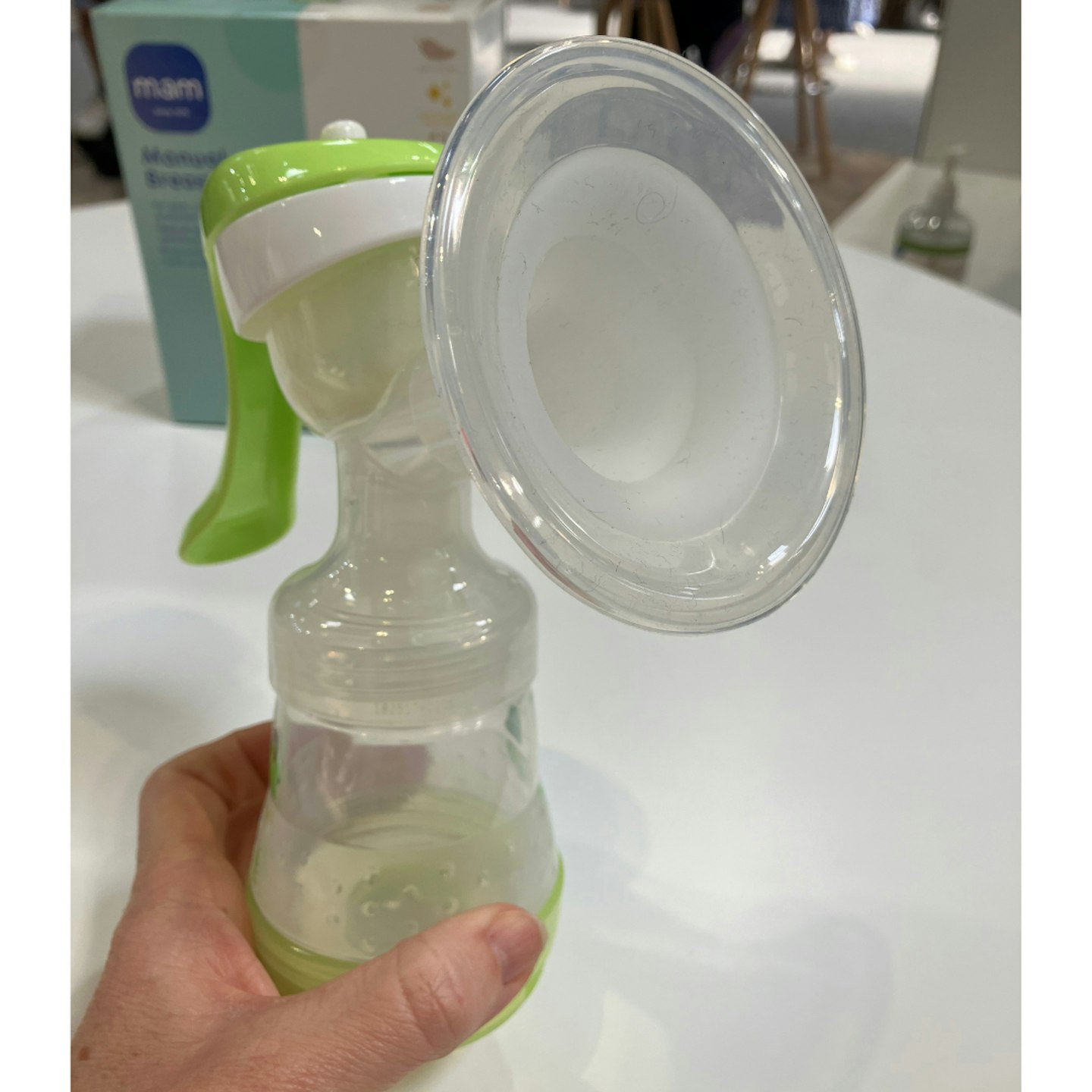 MOTHER&BABY
MOTHER&BABYwww.boots.com
If you are a fan of MAM bottles, this MAM manual breast pump may be perfect for you. Your milk will be expressed directly into a MAM feeding bottle for immediate use or safe and hygienic storage. You can adjust the funnel and suction intensity for maximum comfort when expressing, and you can even convert to the MAM electric system with an additional kit if you decide to go down that route later.
Our Mother&Baby mum reviewer Carla said: "I would recommend this product as it is comfortable on the breast. The MAM pump has a lovely design. The funnel is very soft and doesn't cause any marks on the skin. It is quite small, so it can fit in your bag if needed to pump on the go or at work. The parts can be taken apart, so they can be sterilised easily."
In fact, there are only four parts to put together, making cleaning and sterilising relatively simple. This pump seems to get good results for most reviewers and gets bonus points for compatibility with other MAM kits.
Read our full MAM manual breast pump review
Pros
- Compatible with MAM products, including the electric pump
- Adjustable suction and 'one size fits all' suction cup
- Easy to clean and assemble
Cons
- Some mums struggled to see the milk coming through clearly
- Four-part assembly
- Adjustable funnel
- Includes one Anti-Colic bottle
- BPA free
4.
Elvie Curve
25% off
Best Wearable Manual Breast Pump
The Elvie Curve is a neat little design that fits into your bra and is, in effect, a wearable manual breast pump. Clever, eh? We love the Elvie Curve because it makes pumping effortless—wear it easily around the home or discreetly outside—and adjusts the suction via a valve. It can be used in one of three ways: while you are breastfeeding on the other breast, pumping on the other breast, or whenever your breast feels full.
"The wearability of the product alone is reason enough to recommend it," said our Mother&Baby tester Louise. "The fact that you can use it while doing other things around the house or feeding your baby is great. You don’t have to worry about wires, batteries or making sure it’s charged. All you need to do is get it in place set the desired level of suction then you are ready to go. It is good that you can adjust the level of suction by a button and most pumps like this do not have this function."
Reviewers did say the breast needed to be quite engorged in order to collect a good supply of milk, but it was very useful to collect leaking milk whilst simultaneously feeding the baby on the other breast.
Read our full Elvie Curve Breast Pump review
Pros
- Catches leaking milk as well as promoting milk supply via suction
- Suction strength is adjustable
- Extremely discreet, hands-free, wearable design
Cons
- Some mums found expressions low or slow
- Stores up to 4oz/120ml of milk
- One press expression
- Cord-free, portable and lightweight
- Lays stably to avoid spills
- Only two parts to clean
- Dishwasher safe
- BPA free
Best Silicone Manual Breast Pump
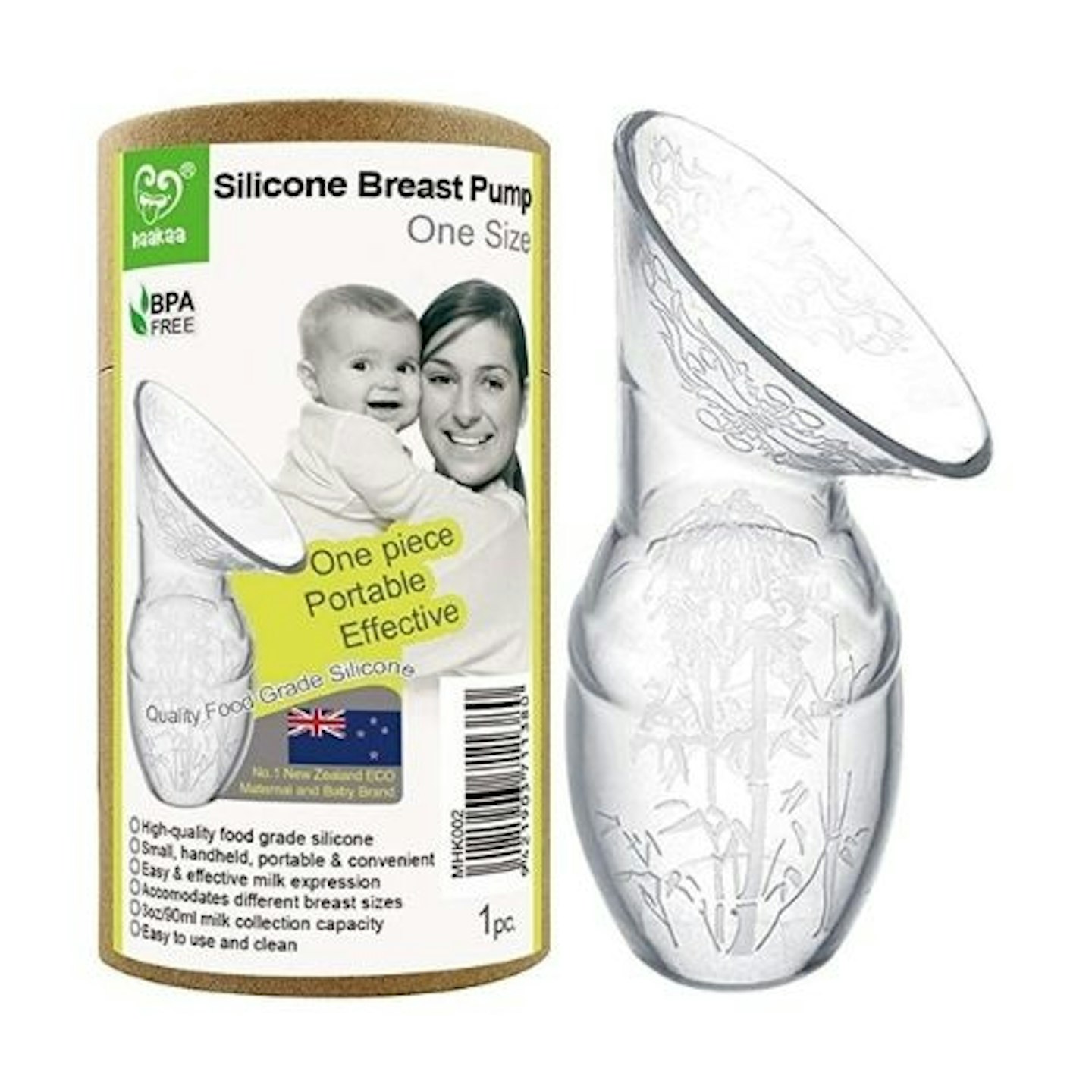 Amazon
AmazonHaakaa Manual Breast Pump is perhaps the simplest and most hassle-free pump. It's designed to be used on the alternate breast while breastfeeding to capture precious milk leaks, but it can also help unblock milk ducts.
Reviewers confirm it's a comfortable and useful piece of equipment but are mixed about how much milk the Haakaa Manual Pump captures - some rave about it, and others are lukewarm, depending largely on their own levels of milk production. If you're a mum who produces a lot of milk or needs let-down relief occasionally, this is for you.
"This is such a genius product," confirms one mum. "It collects the milk from the breast that isn't expressing/feeding, so there’s no waste. But beyond that, because it applies a little bit of suction, it helps with milk production in the crucial first weeks."
This is one of the most popular manual breast pumps because it is easy to clean and requires very little effort—it's also very affordable. Some say the collection bottle is a top-heavy shape, so it is not easy to put down after use while simultaneously holding a baby. A silicone lid and suction base are supplied with the more expensive versions of the Haakaa manual breast pump to help prevent spillages, but they don't come with the standard model.
Pros
- Simple design and easy to use
- One size fits all
- Easy to clean
Cons
- The bottle's shape could be improved for stability. A silicone lid and suction base are not included with the standard Haakaa manual breast pump, only the more expensive model.
- Some mums found expressions low or slow.
- Holds 4oz/100ml
- BPA, PVC and phthalate free
35% off
Best Manual Breast Pump with Bottle
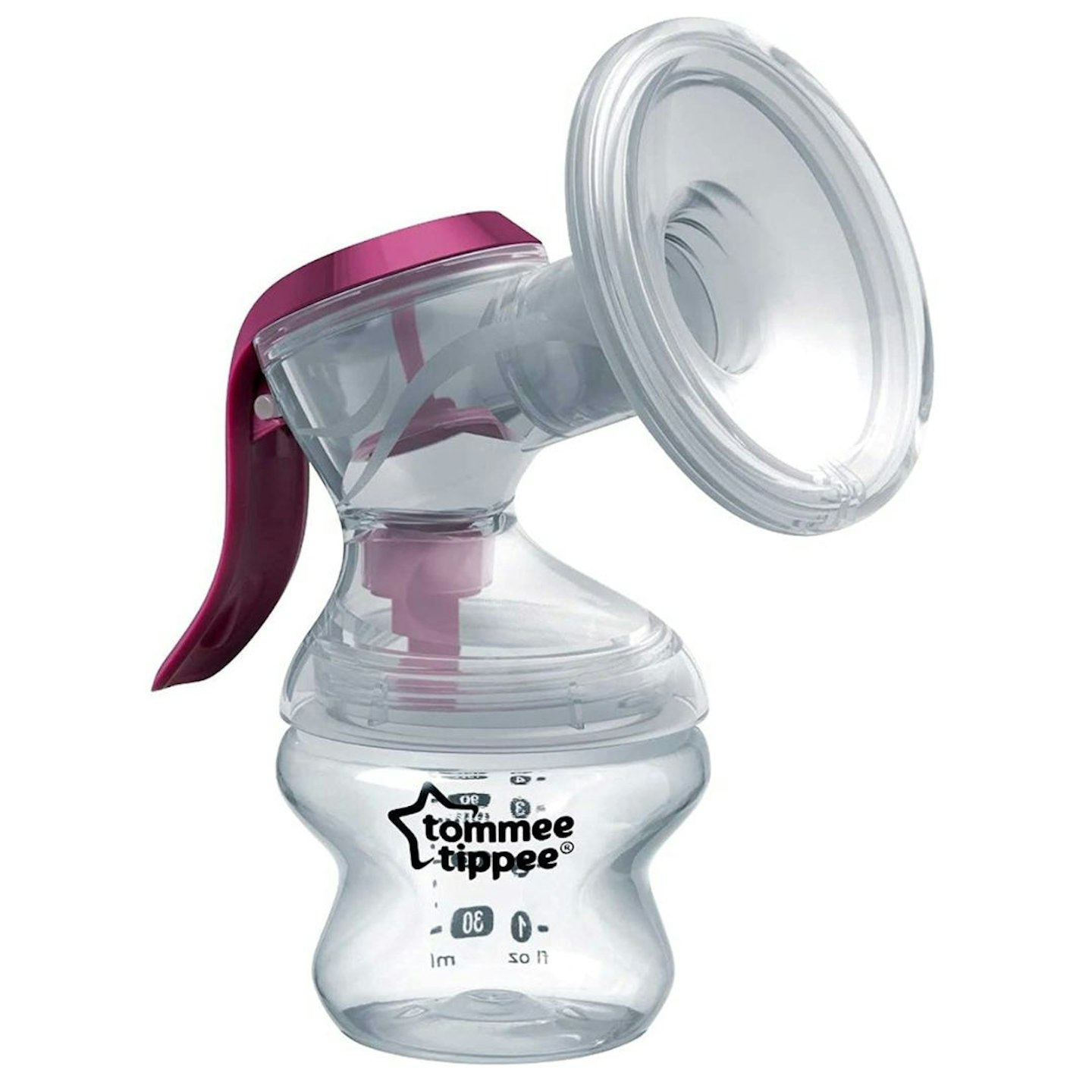 ©Tommee Tippee
©Tommee Tippee The lightweight Tommee Tippee manual breast pump is fitted with a soft, cushioned silicone cup with comfort in mind. It fits neatly around your breast to avoid leaks and has massaging petals designed to encourage flow. Like most manual pumps, it has no tubes or cords, so it can easily be moved from room to room, place to place. It's designed to be used one-handed, and your milk can be caught directly into a Tommee Tippee bottle - one of which is supplied - for easy feeding, too.
"I really liked using a manual pump as you seem to have more control over the pressure on your breast when you first start to express the milk," said our mum tester, Charlotte. "This one worked well. It was also easy to use and clean. It's considerably cheaper than the electric versions, so it's also really good value for money."
Another of our reviewers felt the suction and fit weren't great for her but still recommended it based on design and build quality for other mums. Lightweight and small, it's nice and portable and deserves its spot in our round-up of the best manual breast pumps.
Read our full Tommee Tippee Made for Me Single Manual Breast Pump review
Pros
- Has a soft, cushioned silicone cup for comfort
- Can be collected directly into a feeding bottle which is supplied - with teat
- Easy to assemble
Cons
- Difficult to use at the same time as a breastfeeding baby
- Some felt the fit wasn't great for them and resulted in loss of suction
- Ergonomic shape
- Massaging petal features on cup
- Compact and lightweight
Best Manual Breast Pump with Accessories
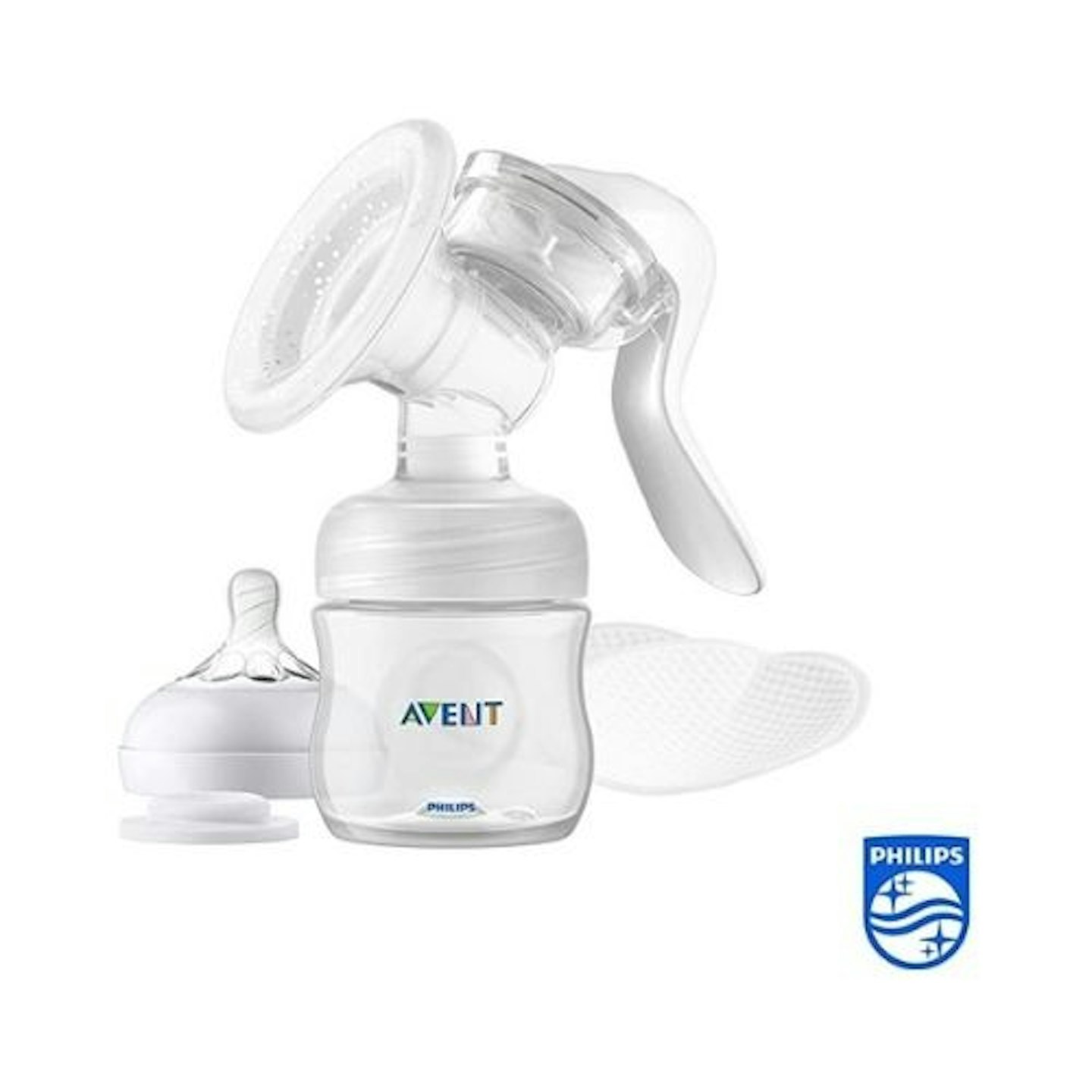 ©Amazon
©AmazonThis pump's silicone breast shield moulds to the nipple to provide comfort when feeding, and the pump itself mimics a baby's suckling action. The small, lightweight kit is easy to transport and clean. It also comes with a teat, and the collection vessel doubles as a feeding bottle.
Our Mother&Baby Mum reviewer said: "This pump is by far one of the best for reducing the amount of milk escaping from the sides (every drop matters to me). I no longer find myself bent over a pump with aching hands; I can actually sit further back without worrying that all of my hard work is wasted on milk determined to flow every which way but inside the pump. Another great point is that it comes apart like a dream and cleans just as easily; I don't have any fiddly parts that require any extra brain power to navigate."
Another mum said it was a good product but that it did not cater well to all sizes of breasts and nipples. "I would suggest that the company needs to make multiple-sized flange inserts (aka the silicon part that fits on the breast) as this type of flange insert does not really adapt to the size of the user, especially with smaller nipple circumferences," she said.
Read our full Philips Avent manual breast pump review
Pros
- Light, small and easily transportable
- Easy to use and clean
- ready shield moulds to the nipple
- Comes with a feeding bottle - which you express directly into - and a teat
Cons
- Some found the suction not as strong as other options
- Some found the rest shield did not cater particularly well to different nipple sizes
- Small and lightweight
- Includes one 4oz bottle
- Includes two disposable breast pads
Everything you need to know about a manual breast pump
Over the years, different types of manual breast pumps have made their way onto the market, all with the aim of making expressing milk easier for mums.
Breastmilk is often referred to as liquid gold, as it is packed full of vitamins and minerals which will help your baby grow into a healthy child. Breastfeeding is a labour of love and requires consistent feeding, so using a manual breast pump could help you and your baby. A manual breast pump doesn't just refer to a pump that is squeezed by hand.
Hand-held pumps: Hand-held pumps are a classic style that typically have a handle or lever that you squeeze to create suction. This pull uses vacuum pressure to draw out milk.
Collection shells: No pumping required for these, they simply sit in your maternity nursing bra like a nursing pad and collect the milk that leaks between breastfeeds or when pumping.
Silicone pump: These are often used to collect milk from the opposite breast to the one you are feeding from. You don't need to continually hand pump and instead rely on vacuum suction which can be established from a squeeze once attached.
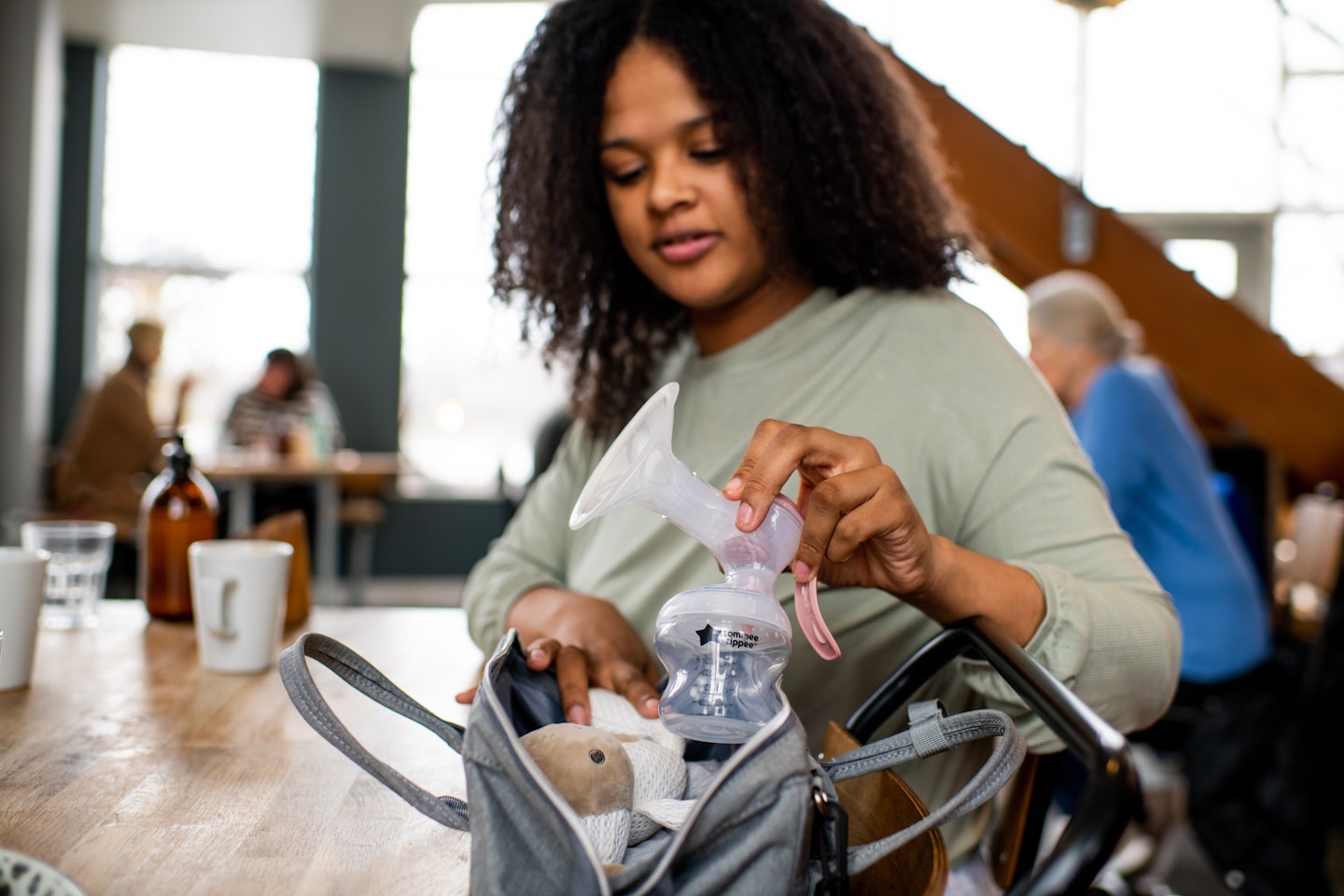
How to choose a manual breast pump
Because a manual breast pump can feel like an intimate and important purchase, there are a few things to consider when picking one in order to make the right decision for you and your body.
Comfort - Take your breast size and what you think will feel comfortable into consideration.
Features - Does that breast pump perform in all the ways you need it to? Will it work with your routine?
Price - It can be easy to feel pressured into buying the most expensive gadgets, but definitely stick to your budget. Different manual breast pumps have different price points and ways of use. You might want to consider the reason behind using a breast pump, how often you plan on using it, and your personal preference.
We have taken all of these elements into consideration when making our selections above.
How to use a manual breast pump
If you're wondering how to use a breast pump, follow these instructions for the different manual pumps.
It's important to always start by washing your hands. Before using your pump and bottle, make sure they are clean and sterile. You might want to find a quiet space where you won't be disturbed so you can pump in peace.
Tip: begin by massaging your breast for a few minutes – this helps with the let-down reflex.
Hand-held pumps: with the bottle attached, place the breast shield over your nipple and make sure it's in the centre of the funnel. Gently press down on the handle to stimulate milk flow and repeat. Once your milk starts to flow, press the handle and hold for a few seconds before releasing it.
Collection shells: This doesn't require hand pumping. Simply place it in your nursing bra and ensure your nipple is aligned with the opening. The cup will then collect milk that leaks between feeds or on the opposite breast while feeding.
Silicone pump: Gently squeeze the pump to release air inside it, and while still squeezing, attach it to your breast. When attached, release your grip on the pump, which will create a suction that starts to express the milk.
Tip: When your milk starts slowing down, switch breasts. Then swap back again as you may find you have more milk to express.
Once you've finished expressing, remove the breast shield and securely store your fresh breast milk.
After pumping, always clean and sterilise all of your feeding equipment.
Manual vs electric breast pumps:
Everyone is different, so many mums-to-be can easily feel on the fence about picking the right type of breast pump for them. Here are some pros and cons of both manual and electric breast pumps so you can make a more informed decision.
Manual breast pumps
Pros
• You don't need a power source which is more convenient (and can be quieter too)
• They're a great budget option compared to electric versions
• Manual pumps can be great for women who are maybe undecided about breastfeeding in the long term or for women who just want to express themselves occasionally
• Can relieve pressure from the breast if you have any uncomfortable engorgement or blocked ducts
Cons
• Manual breast pumps can be more time-consuming
Electric breast pumps
Pros
• They're more versatile, making it easier to double pump if you need to
• Electric pumps enable women to exclusively express and enable stimulation of the milk supply, which is why they're recommended for anyone planning or needing to exclusively express (for example, pre-term baby, returning to work pre-six months or maybe going away for a weekend in the first six months postnatal)
• Designed to be a hands-free option
• Gives you more control over the speed and intensity of pumping
Cons
• They're typically pricier, and not all are wireless
• Some women struggle with the suction level
FAQs
Can I pump straight after birth?
For mums who are directly breastfeeding, the NHS recommends waiting until 4-6 weeks when milk supply is established because too much stimulation using pumps and breastfeeding can lead to an oversupply of milk which can increase the chance of blocked ducts, mastitis or lactose overload in the milk which can cause some digestive symptoms in the baby. If women are exclusively expressing or the baby cannot directly breastfeed, then hand expressing to obtain milk to give to the baby for each feed will be recommended, followed by pumping to help stimulate and ‘demand’ the supply.
It is recommended to hand express first in the first few days until the milk has transitioned, as the small amounts of colostrum (the first milk) can get lost in the attachments of the pump. Ideally, the first hand and pump expression should happen in the first few hours to increase supply. For women who are having concerns with milk supply, baby weight loss or want to combination feed, pumping will be discussed on an individualised basis. However, each parent's feeding journey will be different, and it is safe to pump straight away if you feel that is what is right for you and your baby, taking on board the benefits and downsides or potential impacts of expressing and feeding intention. Every feeding journey is different, and it’s important to do what feels right for you.
How to store breast milk
• Breast milk should be stored in a clean sterilised container or milk storage bag.
• Milk can safely stay in the fridge for up to 8 days at 4C or lower
• If you're unsure of the temperature of the fridge or it is above 4C, use it within 3 days
• Breastmilk can be stored for up to 6 months in the freezer
• Milk that's been cooled or defrosted in the fridge can be carried in an ice-cool bag for up to 24 hours.
• It is best to store breast milk in small quantities using special storage bags to help avoid waste. It is important to label and date it.
How do I heat breastmilk?
You can warm breast milk by putting the bottle into hot water and checking the temperature to ensure it is not too hot for your baby. Ideally, it should be no hotter than body temperature. Never microwave milk. It may create hot spots and lead to your infant getting burnt.
What should you do if you are having difficulties feeding?
Visit the NHS website for more information about infant feeding or find your local breastfeeding support services.
Samantha Ball is a Product & Lifestyle Writer for Mother&Baby and freelanced for the website for two years before joining the team full time. She's a mum of two and loves browsing for the best products and cute outfits.
